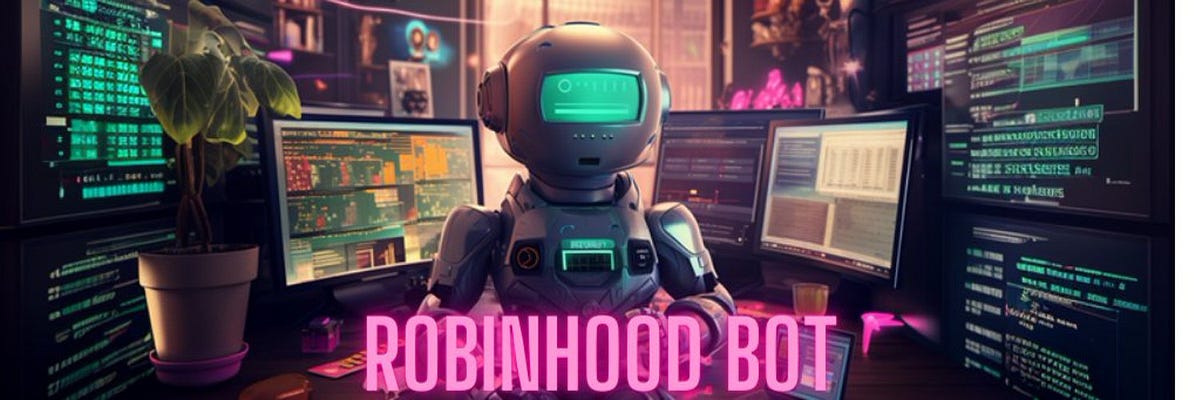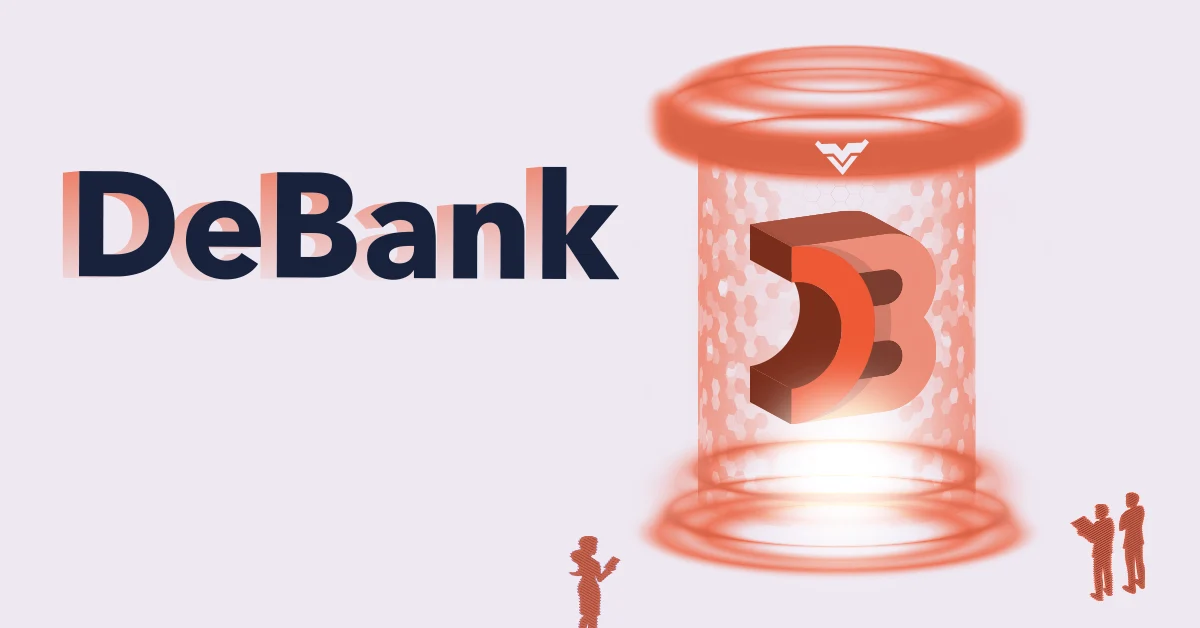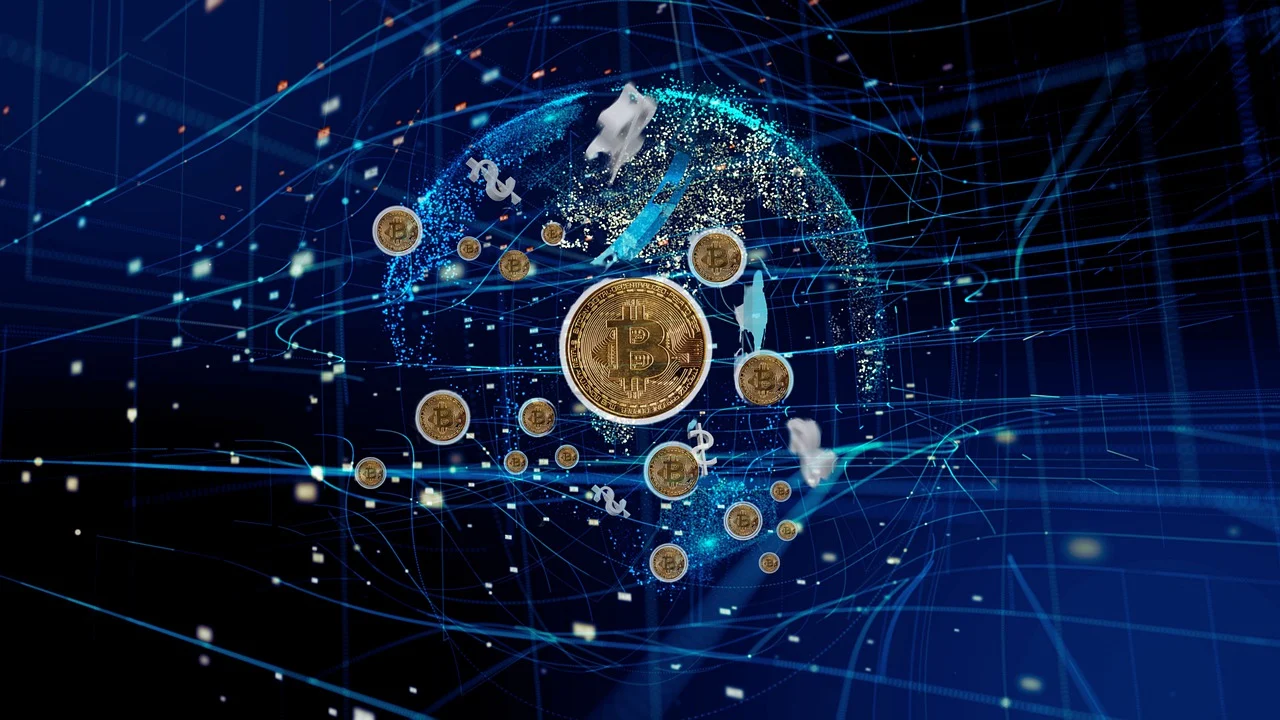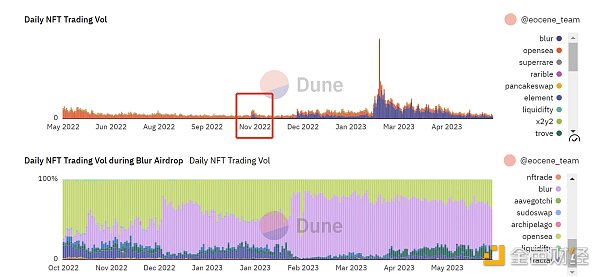Open Class | How to achieve authenticity in an information-pollution environment?
In the era of information flooding, everyone has the opportunity to spread information and publish information, drowning in massive information. How to quickly extract the most important and critical parts? How to improve the ability of information analysis? Different search engines sometimes get completely different search results. What practical tools and resources are recommended? The 7th issue of Wanxiang Blockchain Online Public Course [Live Room] invited Liu Feng, the editor-in-chief of Lianwen, to share with everyone "How to achieve authenticity in an information-polluted environment?" ".
The following is the full text of Liu Feng's speech:
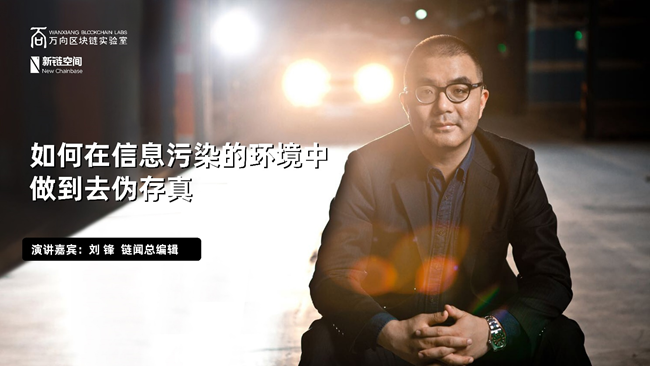
Good evening, everybody! This is Liu Feng, editor-in-chief of Lianwen. Special thanks to Wanxiang Blockchain Lab and Xinchain Space for organizing this online open class at Honeycomb Academy. The topic shared today is: "How to Demystify in the Information Pollution Environment", I hope everyone can interact on this topic.
- How much do you know about the history of Ethereum? Here is a brief history
- Global blockchain status: Asia is the most competitive, and Africa is the largest target market?
- Observation | Xiong'an Blockchain's 3rd Anniversary: From the first tree with an "identity card" to the official opening of the blockchain laboratory
1. Mass information needs to be selected: information should be subjective and objective
This topic was chosen because the current information environment is very complex, and we must screen for information in a complex environment with information pollution. Everyone has this feeling: we have to face massive amounts of information at all times. Especially in the blockchain industry to which we belong, this is an information epidemic area. First of all, the soil in which this industry grows is anti-traditional, far from being mainstreamed, full of community spirit, and lack of credible intermediaries; second, blockchain is a relatively cutting-edge industry with many new terms and technologies, It is difficult to explain in ordinary language; third, this industry is closely related to the financial industry, and it is more likely to produce information or information contamination.
In ancient times, the dissemination of information could only depend on word-of-mouth, and perhaps only folk songs could record some things. And today, we are in another extreme environment: the amount of information is very huge. For example, if you do not read WeChat for a few minutes, there will be hundreds of unread information tips. Of course, there are benefits. In today's society, access to information becomes easy. In addition to the huge amount of information, it has also been suggested that the Internet has made information searchable, and information can be obtained from tools such as the Internet everywhere, which makes the access to information more equal. In the era of information explosion, the challenge we must face is the ability to screen information. Otherwise, you will find that a lot of worthless information surrounds you.
In addition to the large amount of information, I particularly want to mention that as individuals in life, we all have our own ideas. In today's society, there is a particularly interesting status quo, that is, everyone's ideas are very diverse and diverse. You may not agree with my point of view, and many of your views may not agree with me. In this process, we have actually done artificial and subjective information screening, and everyone will consciously look for the information they like. When it comes to information screening, subjective factors and subjective judgments have allowed people to screen information. The machine algorithm has exacerbated this situation. The algorithm always helps to push the information we like in silence according to our favorite, which in turn has exacerbated our preferences.
When it comes to "information pollution", the most common saying is to discuss the "true and false" of a certain news. In fact, distinguishing between the "true and false" of a piece of news is neither simple nor simple.
I want to use the following quadrant to discuss with you how to distinguish the "true and false" of information. As you can see on the screen, the left side of this quadrant focuses on objective existence, that is, information related to facts. But on the right, it is a subjective thing, a point of view. The content about "facts" can be distinguished between "true" and "false", but a lot of information is not just facts, but also subjective opinions. In this way, it is obviously impossible to distinguish between "true and false". We must understand that a lot of information is a combination of facts and opinions, between subjective and objective. At this time, we need to distinguish between objective facts and subjective viewpoints.
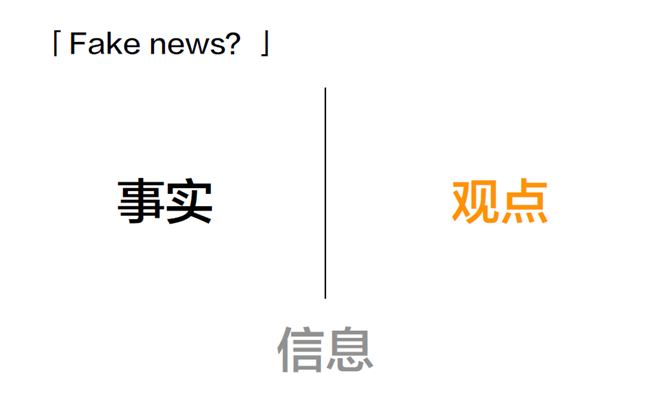
It is relatively easy to verify the objective truth of a thing. However, the existence of subjective factors can make many facts very complicated and difficult to recognize, this time it is necessary to think more deeply.
For objective facts, the most basic principle is to "respect common sense" and verify and verify by multiple parties. We often encounter some contaminated information, which in most cases is contrary to common sense. The problem is that we are reluctant to treat some information with common sense to do secondary verification. To give a particularly simple example, perhaps every few days, your friends circle will continue to spread some sensational news. For example, in the past two days, a "news screenshot" about "The Queen of England was diagnosed with a new coronavirus pneumonia" was widely spread. The spread of such information is very wide, and when we see such information, the first sentence usually asks "Is this true?" Because this sensational news spread rate is higher, and everyone is happy to spread it. In fact, with the development of social media today, the more “explosive news” that is easily spread on social media, the more doubtful the truth behind it is.
I am particularly willing to distinguish between what is “breaking news” and what is “explosive news.” I used to work in the Chinese version of Bloomberg Business Weekly. This is a Bloomberg Group magazine that uses Bloomberg ’s unified news standards. Bloomberg ’s News has a writing guide called "Bloomberg Way". Regarding factual news, several "F" principles are mentioned:
1. First, is news exclusive? Is it the first person to get news facts?
2. Fast, reporting news must be fast, and it must be ahead of others and tell everyone when the information is still fresh.
3. Fact refers to the fact that it must be close to the facts and the accuracy of the news.
4. Fair, to be fair and fair.
In fact, these "F" are basic requirements for news organizations with brands and credibility. News that meets the above criteria can be called "burst".
Because social media is especially developed now, everyone is particularly happy to spread some seemingly interesting and shocking information. The more such content, the more likely it is that "toxic information" appears. A basic principle is that when you see a message that is really shocking, think about it: "Is this true?"
2. You need to pay verification costs for valuable information
The method of confirming the facts is actually very simple, that is, "verify, then verify". But verifying the facts is a very high-cost action, because most of the time we are only willing to digest the information quickly and then disseminate it, without verifying and verifying the facts.
To give everyone a suggestion, when you get information, you should ask yourself: Are you reading Lace News for fun, or are you serious about getting information? If you are looking for fun-like information, you do n’t need to pay too much. You just need to be happy for a while and do n’t need to spend so much time to verify.
But when a piece of information is important to you and you need to use it to make further judgments, you should invest some cost to do the verification work. Verification is easy, find people you trust and find the true source of news.
Often when people have doubts about some problematic news, most people are reluctant to do further verification, because verification is costly. Therefore, I strongly suggest that when dealing with information, you should ask yourself: is this an entertaining reading, or is it really collecting information for professional and professional purposes? Only if you want to understand this and make a distinction, you will understand that it is necessary to verify the cost of a lot of information.
Of course, not all the time, everyone has the resources to do information verification. A very simple way is to find sources with better reputation. Although there are times when there is a mistake in the source of good reputation, we are indeed in an emerging industry, but in terms of information acquisition, it is still very important to have brand news sources and reputation endorsements, especially at this stage.
What I just talked about is confirmation of facts. However, in the environment of information pollution, information pollution is often caused by different perspectives and different viewpoints. Information seen from a positive perspective is completely different from information seen from a negative perspective. This is where "subjectiveness" works.
The role of this subjective thing is often subtle, allowing you to see what you believe, and then strengthening your self-concept, allowing you to believe what you see. In many cases, our choice of information is based on subjective judgment. Today, people obtain information through recommended information. What is referral information? The information pushed to you in front of you through an algorithm, or the information pushed to you by your circle of friends. There is a big hidden danger in such information. Because the algorithm is just looking for your points of interest, and subconsciously continuously solidify your existing ideas, and the circle of friends is also a source of information that you have screened. Recommended information will actually seriously affect the diversity of information you get and the diversity of perspectives.
I suggest that you think about it when you see any information. What angle is behind this information? Has this information been screened, what is the screening principle, what are the possibilities that have been screened out, and where are the news sources obtained from?
Of course, there is still a very important point, that is, self-examination and breakthrough. We have to think about whether we also have prejudices. Prejudices may cause us to consciously or unconsciously ignore many angles in the process of information screening. At this point, the theory is very simple, but it is difficult to solve, because as a person, we must believe in ourselves and unconsciously strengthen our ideas in various situations.
I suggest that you can do more "anti-instinctive" things and realize where your prejudices are. Personally, I believe that everyone has their own prejudices. It is difficult to abandon all prejudices. But we can better understand ourselves and restore information more effectively in the process of information restoration.
Personally, I am a consumer of large amounts of information and a producer of large amounts of information. I am also a person who is particularly keen on reading various gossips and is curious about information. But my overall perception is that because the information is too complicated and the quantity is too large, we should actually do some subtraction. Do n’t be addicted to believing that a large amount of information can give you real knowledge, but believe the value of the filtered information.
We are often dominated by subjective information, and we need to find relative objectivity in the subjective. I object to relying solely on machine algorithms to push news for everyone. In entertainment news, social news, consumer news, push-type consultation is very helpful, it will know where your points of interest are to make you happy. But as professional or professional information, the editor's pick may be the most valuable.
3. My "subjective" quality information source recommendation
I would like to share with you below. I personally feel that some of the information in the blockchain industry is good. Of course, this may also carry my strong prejudice.
In terms of blockchain media, I have several recommendations:
One is Coindesk, which is a relatively long-time English media in the industry that has been well-received.
The second is THE BLOCK, which is a blockchain media that appeared in the fourth quarter of 2018 and is very new. It has sprung up and has a small amount of information, but it has selected information worthy of attention. For me, the amount of information is rich enough, which is very helpful in many cases.
The third is Messari, the information section is relatively small in number, but has supplementary value.
Fourth, an article written by the Wall Street Journal's reporter Paul Vigna on blockchain. Up to now, the mainstream of the blockchain industry in the coverage of the blockchain industry is still very limited, and there are not many high-quality traditional media reports. But I really like Paul Vigna of The Wall Street Journal. He started to report on the development of the blockchain industry from the perspective of the financial industry. He has experienced ups and downs in this industry and has always insisted on writing in a very mainstream business media. In the blockchain industry, his works can give me valuable information.
There is too much information about the uncertainty in this industry every day. These media will help you to select and quickly understand the main flow of the industry. At the same time, I admit that there is also a lot of valuable information in the industry that is in the corner, so I like all kinds of Newsletter.
At the end of last year, Dragonfly Capital, a blockchain investment fund, organized a summit in Beijing and invited several big names in traditional industries, including Wang Xing, the founder of Meituan. During the meeting, I chatted with Wang Xing. He expressed his interest in this industry and asked me a particularly good question: There are so many messes in this industry. What do you think is the most valuable and unique thing? I said to him, "You must know about media like Coindesk, but I will recommend you to read all kinds of Newsletter." He asked me to help him recommend some good Newsletter. I can recommend the recommendations I gave him at that time to everyone.
Here are a few Newsletters I like very much:
-Defiant: It was founded by Camila, a former Bloomberg reporter, and is basically updated daily. Content About the various innovations and in-depth analysis of the DeFi field in the Ethereum ecosystem, I think this is the best Newsletter about DeFi in the Ethereum ecosystem.
-Messari's Unqualified Opinions: I also like this Newsletter edited by the founder of Messari very much, because of the analysis, I will also recommend some news worthy of attention.
-Bankless: This is also edited by loyal Ethereum fan Ryan Sean Adms, which is usually updated 3-4 times a week. In addition to writing his own articles, Ryan Adms also invites great guest authors to write in-depth articles. There are different topics for several updates every week, including in-depth analysis, trend introduction, etc., and there are many particularly useful content. Ryan and I have always communicated. He hopes to do Chinese content. Lianwen is now helping them to do Chinese content. It will help him select some content that Chinese readers are interested in for translation and publish it on Chinese Newsletter platform. At the same time, it is also published on the public number and website of Lianwen.
-In addition, many particularly good blockchain investment funds are doing newsletters. For example, I like Iconfirmation Newsletter, it is very hardcore, has some very open opinions, and will share the topics and perspectives that are worthy of attention at the moment.
-Pantera's Chief Investment Officer Joey has a Newsletter, which is very interesting, covering a wide range of information, including blockchain-related information, and a lot of broader financial information. It can be used as a quick review of daily news, which is very helpful.
In addition, there are two Newsletter I like:
A: Optech is Bitcoin, very hard core, there will be some bitcoin technology updates.
-The other is Coin Metrics' State of the Network, which is a weekly newsletter with data analysis on the Bitcoin network or other markets, which is quite good.
I personally feel that these are relatively comprehensive. In fact, there are a lot of Newsletter, it is difficult to give up, I can receive nearly 200 Newsletter a week. Some are weekly and some are daily. Our editorial team at Chain News is great. They are newsletter lovers like me, and we often communicate together to see what fun things we see. In the field of blockchain, Newsletter is invaluable, and most of it is free.
Just now I talked about THE BLOCK media, they have compiled a set of tools related to blockchain industry research and data on the website, the URL is: https://www.theblockcrypto.com/post/10570/the-blocks-list -of-crypto-research-tools-and-resources
I made a simple screenshot, but there are actually more tools listed on this page than screenshots. You can find many treasures on it. Everyone can look back at the address and find what they like on it. Here, I especially want to thank the THE BLOCK editorial team for their contributions. The resource set they made is really awesome.
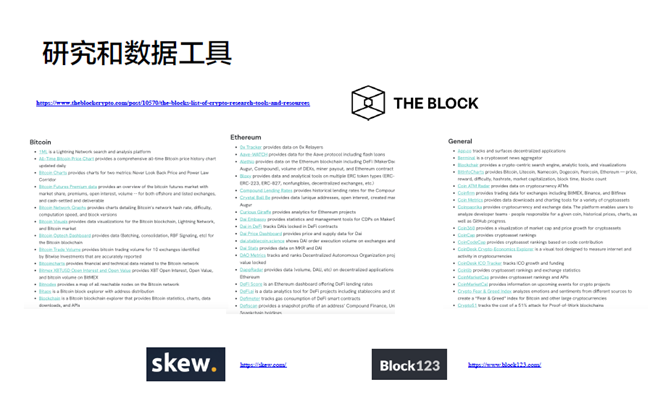
In addition, last year there was a particularly good startup called SKEW, which was processed by people from three traditional investment industries. They provide transaction data, which is more concentrated on derivatives transaction data. This is the best data source I have seen so far.
As you can see, all I recommend is information in English, which may be my prejudice. I think that in this industry, the severity and accuracy of the information on the English information platform is relatively high, and the advantage of foreigners is that they are very willing to summarize and summarize, there will be many ready-made tools and resources for everyone to use. This is my prejudice. What I currently recommend is English content.
Of course, I would also like to recommend an interesting tool: Block123.com, which is a Chinese product and the work of our team. At present, we have not done a lot of promotion because we think this product is not mature. However, this does not mean that it is not easy to use.
We previously called this product blockchain navigation, which is a navigation website. But in my opinion, it is actually a database, a database about blockchain projects. You can try it on the website. Now the page is relatively simple, but if you want to learn about new projects, search on it may give you some surprises. This product is very interesting, we did not recommend and promote it on the market, but I know that many professionals in the industry are using it, and the feedback is good.
Open social media such as Twitter and Weibo are also a treasure trove of information. In the blockchain industry, you can find information through Twitter and Weibo, but the complexity of information on social media platforms is far beyond imagination. My point is that on such platforms, you need to find credible people.
For example, at the beginning of last year, everyone paid special attention to the Lightning Network, but people who know the Lightning Network in China are difficult to find. I consulted many people and did not find a particularly good expert. But when I searched on Twitter, I accidentally searched for a hard-core expert who built the Lightning Network Festival and wrote about the basics and deep science of the Lightning Network, so I quietly followed him.
There are a lot of hidden experts on Twitter and Weibo social platforms, provided you have a way to find him. My general principle is to find someone worthy of my trust and find his circle of friends. It is often the case that everyone pays attention to each other and favors each other, a bit like a friend recommendation, you will find a lot of interesting and worthy of attention.
In this regard, we are making some attempts. We are doing an experiment with X-Order, a cool research institution, to analyze the interpersonal relationship in the blockchain industry through the knowledge graph, and we hope to find the relationship between people in the blockchain industry in this process. To better uncover hidden information.
This is like an implementation. We very subjectively choose some fun and trustworthy Twitter opinion leaders. After scoring these opinion leaders, X-Order uses a machine algorithm to develop a model based on the scoring of the human brain, and uses the model to determine which information is ignored by the media, but has been recommended by trusted opinion leaders on the Twitter platform come out.
What we are doing now is called "Minority Report", which recommends 10 valuable messages published on Twitter every day through an algorithm. This report has a great overlap with the hotspots and news of the day, but there are also some interesting phenomena and opinions that are ignored in the news media reports. This is the experiment we are doing. We will tell you when it is appropriate. In the field of blockchain, how individuals rely on the power of nodes to find reliable information is an attempt, but such content is also subjective.
The above is my sharing, I hope to help everyone.
4. Interactive Q & A
Question 1: Recently, many knowledge payment platforms have developed rapidly. What's the point? Do you find it really useful for readers?
Liu Feng: Knowledge payment is not my food. Knowledge payment was an investment outlet a few years ago. When I was editor-in-chief of Bloomberg Business Weekly, I did not like my reporter to do such a theme, because I personally do not like knowledge payment products. I hope humans have breakthroughs in knowledge acquisition and learning, but in my opinion, learning knowledge requires more time cost, and there are few shortcuts to take. Knowledge payment is hardly such a shortcut.
Just now when I talked about reading and information extraction, it was divided into two parts: (1) consumer-level reading and recreational reading; (2) reading related to professional development and professional knowledge acquisition. This needs to be done more seriously and systematically.
If it is purely pastime knowledge, I am more willing to use knowledge to pay for it. Because knowledge payment often occurs when "experts" chew very difficult content and give you something that has already been chewed, and let you pay for it. But this is very knowledgeable. I have n’t used a knowledge-paying platform. I ’ve been watching paid products about classical music. It ’s very simple. I think it ’s cool as a pastime.
As for professional-related knowledge, everyone should know the "10,000-hour theory". This must be a boring process. Step-by-step learning is feasible, but it is not very realistic to want to obtain it quickly by paying for knowledge.
Question 2: How to view the pay wall of the media?
Liu Feng: I strongly support the pay wall of the media, but the pay wall of public information that is helpful to the broad public is of little significance.
For high value-added information, such as commercial and financial content, paywalls are the best way to ensure that professional editing teams produce truly valuable content. In terms of technology reports, there is a great media called The Information, which is completely surrounded by a pay wall. You ca n’t watch it without paying. I think its information is worth the money. This model will ensure that the content quality is very high, but this can only be information in a certain vertical field. Professional financial media can be surrounded by payment walls, such as the core news of the Financial Times and Bloomberg. Such information has a high added value and should be paid for.
But setting up a payment wall for public information is not a particularly good way. A typical example is that in the report of the new crown epidemic, at the beginning, the best reports and the most valuable information came from the media with pay walls, but these media soon realized that such information should be open To all audiences. The well-known media around the world have lifted the in-depth report on the new crown epidemic situation to lift the pay wall. This is a very sensible approach, because there is no need to use the pay wall to protect public events.
However, I strongly recommend that everyone pay to read good paid content.
Question three: You were the editor-in-chief of Bloomberg, and the blockchain is still in a very early stage. What motivated you to join the blockchain industry and create Chain News?
Liu Feng: I have worked in the traditional media industry for 20 years. I respect traditional media very much. Traditional media plays an important role in today's society, but the reality is that this is a relatively sunset industry. When I reach a certain age, I want to try something new, and blockchain makes me very interested. For me, it is valuable to cultivate and study in new fields. I believe that the blockchain industry will revolutionize and innovate the current Internet industry. I have experienced the upsurge of ".com" and the upsurge of the mobile Internet. It is extremely rapid for any new technology to replace the old field. I believe that the same is true for blockchain.
However, the blockchain industry is still at a very early stage. As a media person, it is particularly good to be able to continue to learn and continue to deal with different people in the industry, which is quite enjoyable for me.
Question 4: Could you please tell us how you have worked for many years? Is there any recommended or summary content to share with you?
Liu Feng: I want to share my real thoughts with you more. My age is "old", but it is especially "new" in the blockchain industry, only two years.
I have also reported on the financial industry before. The traditional industry is full of various hierarchical concepts and class divisions, but the blockchain industry is a very equal industry. When I first entered this industry, I consulted the so-called "old man in the chain" who had been immersed in this industry for many years. They were particularly happy to share and gave me a lot of help. This is the place I feel the most.
I have been thinking about what kind of things can be done to really make the "sharing spirit" become the main theme in the industry. If you are willing to learn in the blockchain industry, there are a lot of resources to learn and a variety of things that can guide you teacher.
Back to today's topic: How to achieve authenticity in an information-pollution environment? The best way is to find someone who really understands the industry by communicating with others. The information obtained in this process is the most valuable.
5. The 8th notice of the online public class of Hive College
At 20 o'clock on the evening of April 9 (Thursday), Honeycomb College online public class will invite two industry leaders with rich experience: Lin Yao, founder and CEO of Molian Technology, and Steven Pu, founder and CEO of Taraxa In the live room of the station, how to combine the blockchain with the Internet of Things and further enhance the landing of the Internet of Things. The Internet of Things is also one of the hot topics of the "new infrastructure" infrastructure, but the technology is still in the early stages. When combined with the "trusted machine"-the blockchain, can its "supervised second pulse" be get through? On Thursday night, lock the live room of Wanxiang Blockchain Station B and discuss together!
Now add Wanxiang blockchain assistant WeChat (fengchaoxueyuan) to join the learning group, you can keep abreast of the time and entrance of each live broadcast.
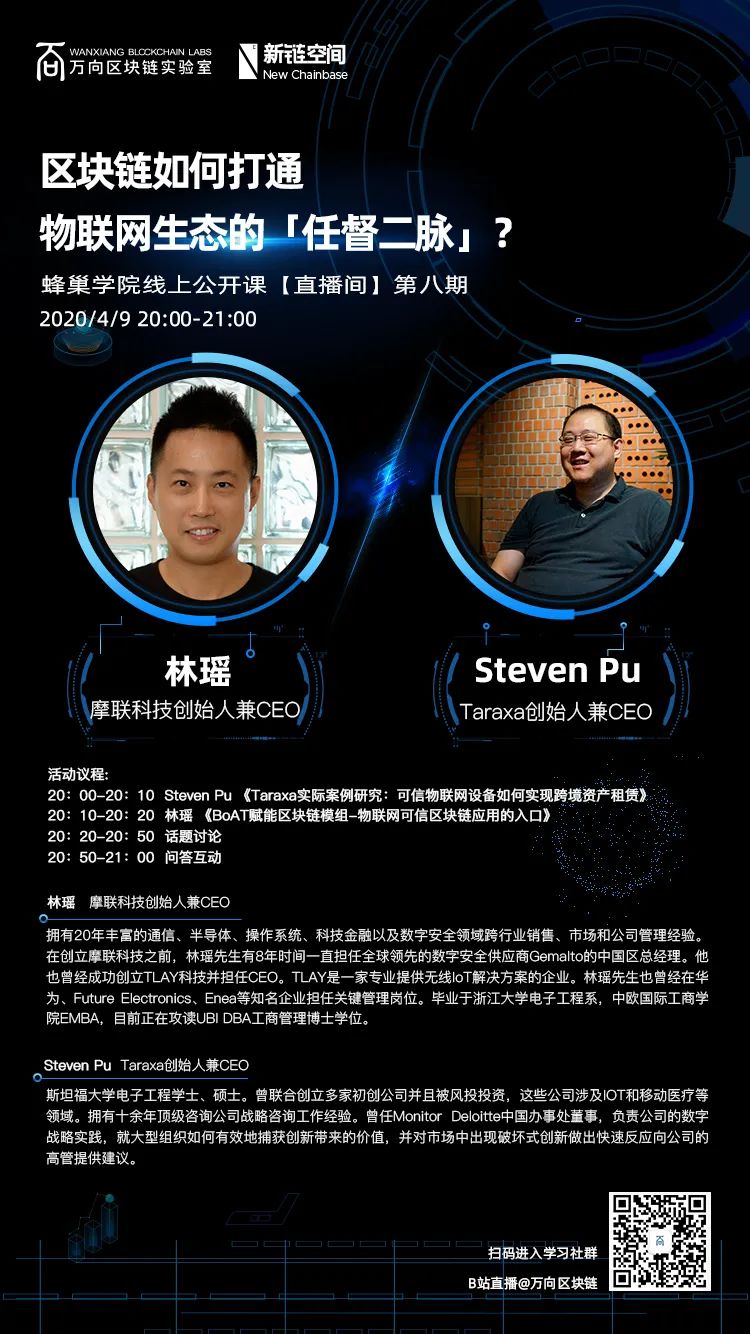
We will continue to update Blocking; if you have any questions or suggestions, please contact us!
Was this article helpful?
93 out of 132 found this helpful
Related articles
- Yao Qian: Three major scenarios and solutions in which blockchain may be applied to central bank digital currency
- Video | Chen Xiaohua: Two attributes, six dimensions, and one center of the blockchain
- The application prospect of blockchain technology in sudden public safety incidents: how to realize "digital city governance" and "digital epidemic prevention"?
- Fragmented identity data, reshaped on the blockchain
- Industry Blockchain Weekly | Blockchain project selected as a typical case of the Ministry of Justice
- Inventory of China's four major trade areas: what has the blockchain "horse enclosure" done over the years?
- Global assets seek anchor under the crisis, which may become the starting point of Bitcoin's eternal bull market

